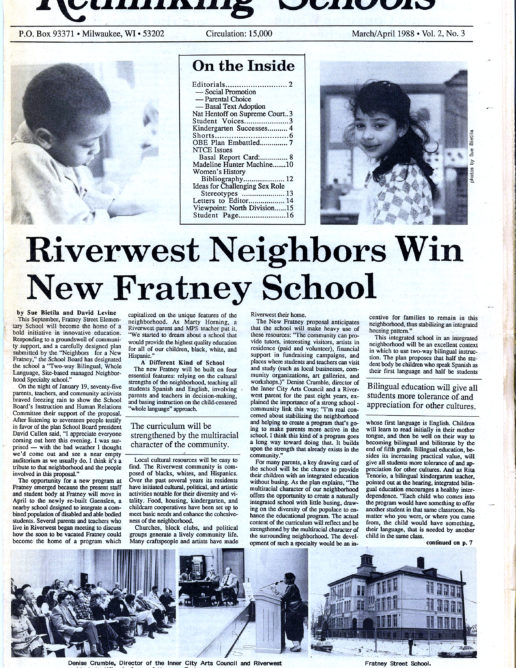Postpone Reading Basal Adoption: Consider Whole Language Approaches
Since the beginning of this school year the MPS Reading Textbook Adoption Committee has been meeting two hours a week to consider a new basal reading program for the Milwaukee Public Schools. The committee’s two dozen classroom teachers, reading resource teachers and generalists have given a great deal of time and effort to this process.
It’s disturbing to learn that the committee decided to make its recommendation of the top four basal series before having even one discussion of the whole language approach to the teaching of reading and before it heard presentations from representatives of the last two scheduled textbook companies. Both companies have made major revisions in their materials in preparation for the California adoption process which is to take place within the year. One company, Heath, presents and teaches reading through literature using an innovative, holistic approach.
The adoption of a new basal will define MPS s method of reading instruction for the next seven years. lt’s cost in the first year alone is anticipated to be $ 1,200,000.00.
This decision is being made without serious consideration of major development in reading and language research. The striking successes in the widespread use of whole language approaches for reading instruction in New Zealand, Australia, Canada and England are being ignored. Suggestions by some members of the adoption committee that whole language alternatives need to be considered were usually met with skepticism by central office specialists and by some of the committee members. The main argument given was that there are so many mediocre, inexperienced or new teachers in our system that a whole language approach would never be successful in Milwaukee.
Instead of expecting a lot from schools and staffs, the alleged mediocrity of teachers is being used as an excuse not to investigate and implement innovative programs. Instead of expecting our school system to adequately train new teachers or in-service current ones, the ineffectiveness or unavailability of inservice training is also being used as an excuse not to innovate. It is unfortunate that the leadership at Central Office can not be as bold and forward looking as their counterparts in Portland, Oregon, West Des Moines, Iowa, or in California (with the California Reading Initiative) where innovative approaches to reading instruction are being enthusiastically tried.
In the words of one reading teacher on the adoption committee, “Why not at least let some teachers try a different method? What we are using now sure isn’t working.”
It’s heartening that a minority report may be issued by some members of the adoption committee, and that the MTEA and some school board members have proposed a year’s delay in the adoption of a new series. One MPS official said that delaying the adoption one year would cost MPS $600,000 just to restock necessary items for the Scott, Foresman series currently in use. He estimated, however, that 70 to 75% of that cost would be in consumable workbooks. Instead of wasting money on workbooks that are from a program nearly a decade old, why not use some of that money on paperback books and a new summer curriculum project in which teachers would develop creative teaching of reading and writing packets to supplement the old series?
It is not too late to have an informed discussion of reading in our school system, and until one takes place, the basal adoption should be postponed. Whole language approaches should be widely discussed as an alternative. The new basal series now coming out for the California adoption should be reviewed. The adoption of an innovative program like the Canadian Holt Impressions as a co-basal should be seriously considered.
It is time to act like professional educators.

